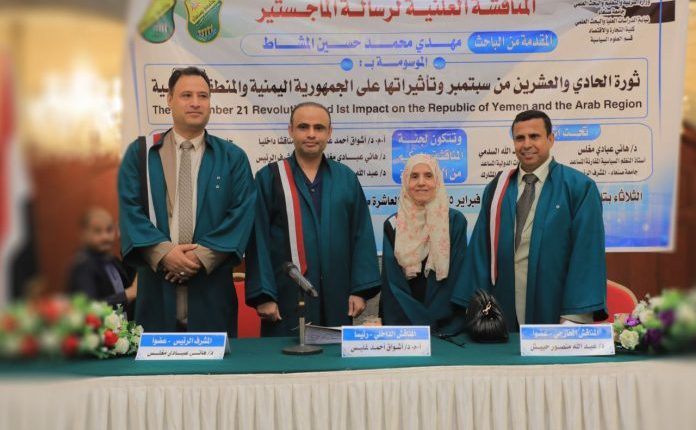President Mahdi al-Mashat Earns Master’s Degree from Sana’a University for Thesis on the September 21 Revolution
Sana’a University’s Faculty of Commerce and Economics has awarded Mahdi Mohammad al-Mashat, President of Yemen’s Supreme Political Council, a Master’s degree for his thesis titled “The September 21 Revolution: Its Effects on the Republic of Yemen and the Arab Region.”
The thesis analyzed the roots of the February 11, 2011 revolution, the role of political forces in the peaceful youth movement, and the broader impact of the September 21, 2014 revolution on Yemen and the Arab world. It also examined foreign interventions and their role in shaping events.
The discussion and judging committee, chaired by Dr. Ashwaq Ahmed Ghalis and including Dr. Hani Abadi Mughlas and Dr. Abdullah Mansour Hobeish, praised the study’s findings and recommended its publication at the university’s expense and distribution among academic institutions.
The study concluded that the September 21 Revolution is a genuine popular movement that united Yemenis against foreign interventions threatening their sovereignty and national interests.
President al-Mashat, the researcher, emphasized that the revolution embodies Yemen’s history, present, and future aspirations, noting that its significance is best understood by those who perceive Yemen as a threat.
Key Findings of the Study:
The September 21 Revolution is enduring, with its influence continuing for generations, as Yemen’s strategic location keeps it vulnerable to external domination.
Foreign interference remains the most significant obstacle to Yemen’s progress, regardless of its motives.
The revolution exposed the misinformation propagated by Yemen’s adversaries and safeguarded its maritime interests.
Yemenis asserted their independence, rejecting external control and reinforcing national sovereignty.
Key Recommendations to Preserve the Revolution’s Goals:
Integrate the September 21 Revolution into school curricula to educate future generations on its historical significance.
Encourage universities and research institutions to conduct further studies on the revolution.
Document and commemorate the revolution’s martyrs and heroes through national programs.
Establish oversight bodies to ensure the implementation of the revolution’s objectives.
Organize seminars and scientific conferences to discuss the revolution’s goals and sacrifices.
Preserve historical records of the revolution’s events and key participants.
Provide financial and moral support to the families of martyrs and the wounded.
Erect national monuments and award honors to commemorate the revolution’s leaders and fighters.

